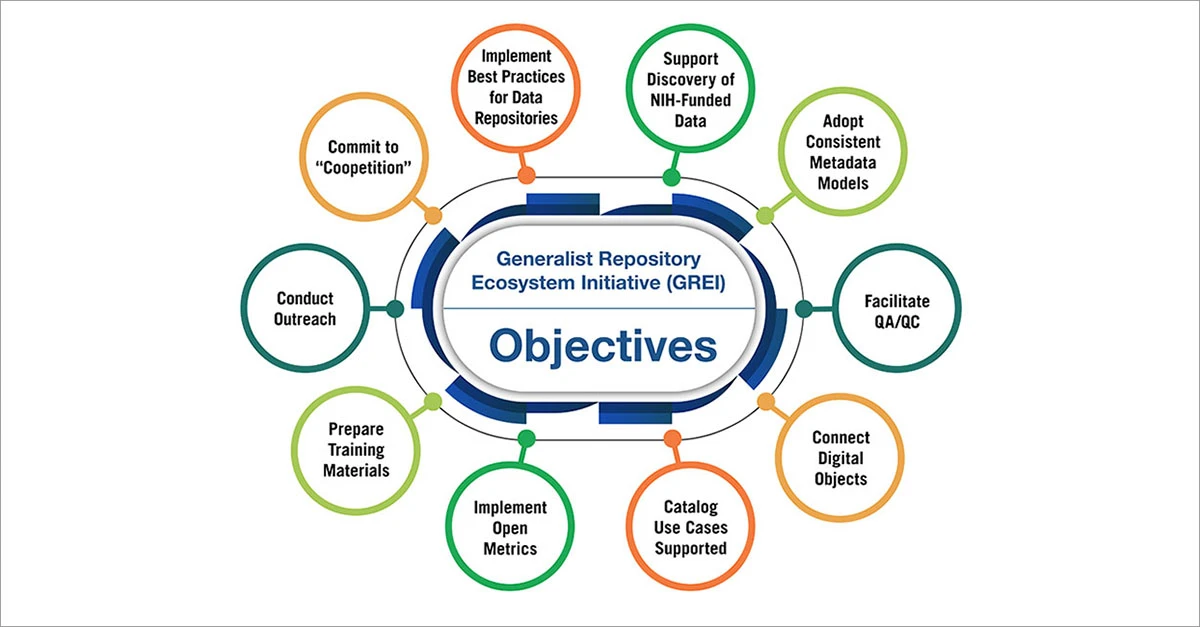Four things you need to know about GREI and why it matters
2022년 10월 28일 | 3분 읽기
저자: Ishwar Chandramouliswaran

New NIH data-sharing initiative will promote transparency while making it easier for researchers to find and share data
Research data matters. It’s central to scientific discovery and integrity and critical for researcher recognition. For funders, managing research data is an important way to provide transparency on how taxpayers’ money is spent.
To support data sharing, the US National Institutes of Health (NIH) 새 탭/창에서 열기 — the world’s largest funder of biomedical research — is prescribing mandates for research data. Here, Ishwar Chandramouliswaran 새 탭/창에서 열기, Program Director in the NIH Office of Data Science Strategy 새 탭/창에서 열기, explains what that will mean for researchers and institutions.
Starting in January 2023, the NIH will require most of the 300,000 researchers and 2,500 institutions it funds annually to include a data-management plan in their grant applications — and to make their data publicly available.

Ishwar Chandramouliswaran
To make it easier to find a home for all NIH-funded data and their reuse, the NIH has launched the Generalist Repository Ecosystem Initiative (GREI) 새 탭/창에서 열기 to supplement and include the generalist repositories in the existing NIH data ecosystem. GREI includes seven established generalist repositories that will work together to establish consistent metadata, develop use cases for data sharing, and train and educate researchers on FAIR Priniciples 새 탭/창에서 열기, the importance of data sharing and more. Those repositories are The Dataverse Project 새 탭/창에서 열기, Dryad 새 탭/창에서 열기, figshare 새 탭/창에서 열기, Mendeley Data, OSF 새 탭/창에서 열기, Vivli 새 탭/창에서 열기 and Zenodo 새 탭/창에서 열기.

GREI participating repositories
So what does this mean for people in the research community?
1. What is GREI?
The new NIH Data Management and Sharing (DMS) Policy 새 탭/창에서 열기, which takes effect January 25, 2023, reinforces NIH’s commitment to making the results of NIH-funded research publicly available. It requires all NIH-supported research to have a DMS Plan outlining how scientific data and accompanying metadata will be managed and shared, including any potential limitations on sharing, and be compliant with the NIH-approved plan. Data management and sharing costs 새 탭/창에서 열기 may be requested as part of a budget request, including costs associated with curating data and preserving and sharing data through established data repositories.
The GREI mission is to establish a common set of capabilities, services, metrics and social infrastructure among the generalist repositories, raise general awareness, and facilitate researchers to adopt FAIR Principles to better share and reuse data. This initiative will further enhance the NIH biomedical data ecosystem and help researchers find and share data from NIH-funded studies in generalist repositories.
2. Why does GREI matter?
It will help foster a culture of data stewardship by promoting effective and responsible data management and sharing practices.
3. What does GREI mean for researchers?
GREI is expected to provide a home for data that may not have a home in the current ecosystem, and to support a broad set of use cases to allow researchers to better plan, manage and share their research outputs. The project is expected to enable better discoverability of NIH-funded data and upskill researchers on best practices of data management and sharing, with the ultimate objective of enabling the reuse of data to improve the rigor and reproducibility of research.
GREI will lower the barriers for sharing data, making it easier for researchers. It will also make it easier for researchers to find NIH data across generalist repositories, meaning they will be able to build on each other’s work and potentially receive credit where their data is re-used.
4. What does GREI mean for institutions?
Institutions will benefit from their researchers being able to share and discover each other’s data more easily. GREI will help avoid duplication of data across generalist repositories. It will ensure that data associated with research publications is readily available and will enable use and reuse of NIH-funded data regardless of which generalist repository the data resides in.
기여자

IC
Ishwar Chandramouliswaran
Program Director, NIH Office of Data Science Strategy
National Institutes of Health (NIH)